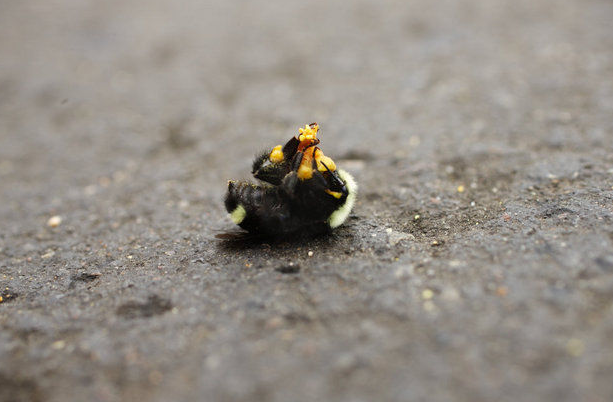Pesticides Kill Oregon Bumblebees
This story both deeply saddens me and gives me hope. For those of you who haven't heard, earlier this week a blanket of dead and dying bumblebees were found on a parking lot in Oregon. The estimated loss was around 50,000 bumblebees; other insects, such as honeybees, were killed as well. Customers found the bumblebees at the base of a group of European Linden trees, which had recently been sprayed with a pesticide called Safari--a neonicotinoid pesticide produced by Valent. After the mass die-off, researchers set out to find out if the culprit was the pesticide or the tree itself; apparently linden tree nectar can be toxic in high doses.
As of Saturday, the Oregon State Department of Agriculture (ODA) announced that "the bee deaths are directly related to a pesticide application on the linden trees conducted last Saturday, June 15 to control aphids." (Link to ODA announcement here). Workers are now covering all the sprayed linden trees with insect-proof netting and officials are looking into the insecticide application to see if their was a legal violation. The pesticide's label gives clear warnings about its application:“This product is highly toxic to bees exposed to direct treatment or residues on blooming crops or weeds. Do not apply this product or allow it to drift to blooming crops or weeds if bees are visiting the treatment area.”What's even more intense is that neonics can persist in the plant and the soil for months or years, so it's hard to say just how long these trees will be toxic to local pollinators. Clearly, this is a depressing story, but here's what gives me hope: Government officials publicly admitted that a pesticide is killing bees. According to the Xerces society, this is the " largest mass poisoning of bumble bees ever documented." Bumblebee deaths happen all the time out in agricultural regions, but because this happened in an urban area, its visibility has been made the link impossible to ignore--and deny. We have definitive proof. Neonics have been one of the prime culprits in Colony Collapse Disorder. As you may have heard, the EU recently banned three neonicitinoid pesticides that affect honeybees. This bold move has received considerable backlash from Bayer and Syngenta and other US insecticide companies (read about Bayer and Syngenta lobbying "furiously" against EU efforts to ban their pesticides). The EPA has been notoriously reluctant to up their regulation of the pesticides--for reasons I won't speculate about here. We can only hope that this ecologically devastating event will bring more attention and increased funding to review these pesticides with a more critical eye. For now--we'll have to wait and see what happens. But here's how you can help:
- Educate yourself on websites researching and advocating around pesticide issues, like Xerces and PANNA (Pesticide Action Network in North America)
- Get involved as a Citizen Scientist with Xerces!
- Don't use pesticides in your garden, but if you need to, check out products that use Neem Oil or check out this comprehensive list from PANNA for alternatives: http://www.panna.org/your-health/home-pets-garden
- Plant bee-friendly flowers and plants in your garden--make a bee haven for all pollinators to enjoy! Then add your haven to this cool map here: http://www.honeybeehaven.org/
- Get more ideas here at PANNA: http://www.panna.org/get-involved/what-you-can-do






